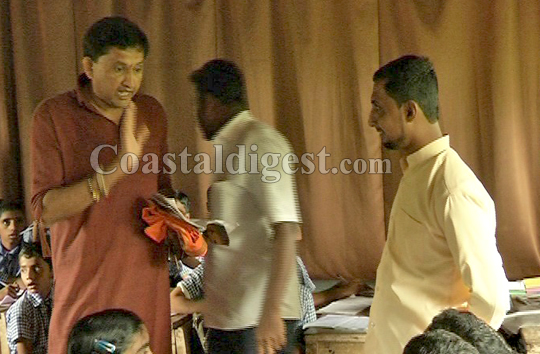Mangaluru, Aug 2: As many as 16 activists (extremists) of Sri Ram Sena, a Hindutva outfit have been arrested by the Mangaluru police after an anti-Arabic raid on a school in the taluk.

Sleuths of Mangaluru Rural police station on Monday arrested 13 SRS activists on charge of trespass into a school on the city's outskirts. On Sunday three were arrested.
A group of Sri Ram Sena activists barged into a classroom of St. Thomas Aided Higher Primary School in Bondantila near Neermarga on Saturday.
While the activists alleged that students were forced to learn Arabic, the headmaster said that classes were being conducted for 40 students every Saturday on the request of parents. The headmaster had filed a complaint with the Mangaluru Rural police.
The police on Sunday arrested Nithin, Dinesh and Santhosh. On Monday they arrested Mukesh, Ravi, Chethan, Nithin, Kishore, Sunil, Nithin, Rajesh, Ravi, Raghavendra, Jayanth, Prakash, and Chandrahas. The police said a total of 17 persons had reportedly barged into the school and created a ruckus on Saturday.
Chief Whip of the Congress in the Legislative Council Ivan D'Souza condemned the act. In a statement, Mr. D'Souza said he has asked the city police to be tough against groups trying to disturb peace and tranquillity.
Mr. D'Souza visited the school and spoke to students and teachers. The Democratic Youth Federation of India and the Komu Souharda Vedike too have condemned the act.
Also Read:
Hindutva activists raid St Thomas school over Arabic class, videograph girls
Mangaluru: Three Sri Ram Sena activists arrested for attack on school





Comments
why only 15 terrorists arrested while 40 to 60 terrorists entered the school by force and threatened the teacher plus students. Let all be jailed under goonda act. Hate mongers should no sympathy. their place should be jail for ever. supporters of these terrorists should also be noted and arrested.
Learning Arabic is a best thing...I would request Hindu students too learn Arabic language, this will help them secure good job in Arab countries and its advantageous.
@ Kiran Rao, as you said they did not harm any one.
Just look at above picture. The tall SRS man entered class room while the teacher was teaching to his students. Is it right ?? 17 members ( not educated, illiterates) gang entering class room?
gonda act should be used against these anti-india elements.
anythng happend in India now this is very common
BELLARY IS THE RIGHT PLACE FOR THEM ....LET THEM ENJOY IN BELLARY JAIL WITH SPECIAL BEEF BIRIYANI....
Add new comment